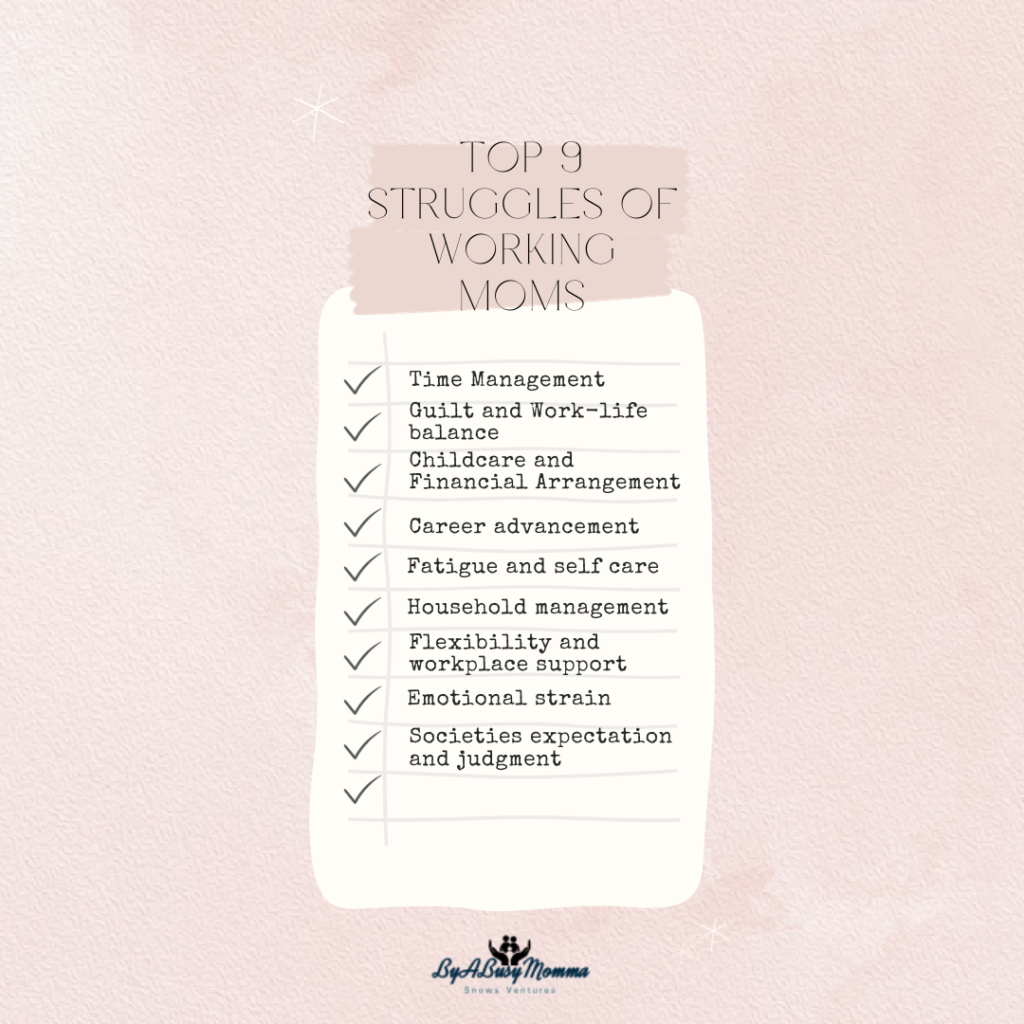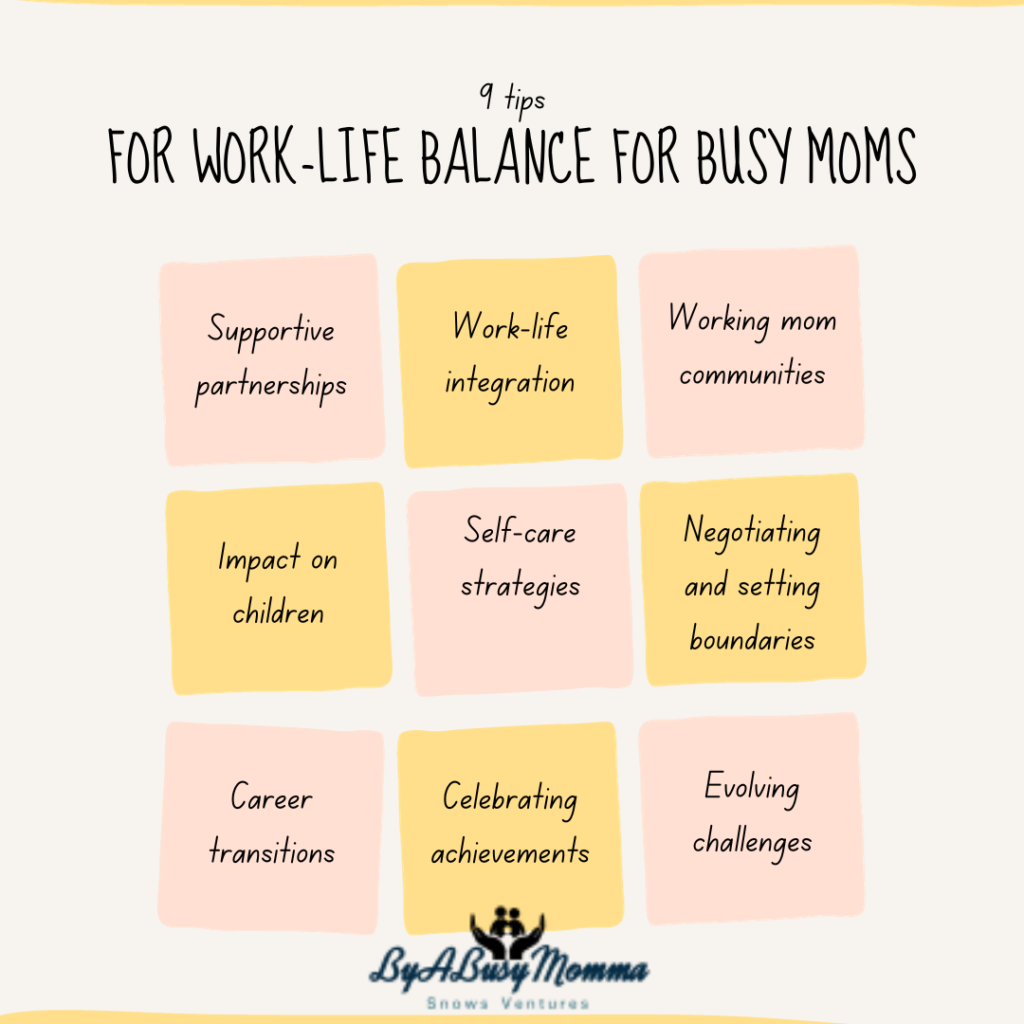As a working mom, I have days when I struggle to balance all the responsibilities that are on my shoulders, trying to balance being a good mom and a good worker. Sadly, as a full-time worker and mom, there are things you give up to balance both responsibilities in your life. This does not mean that it’s a bad thing or that you lose out by giving up something automatically, but it sometimes feels overwhelming. I know many moms out there are in the same boat as me, and I wrote this article for you so that you don’t feel like you’re the only one. Many working moms are in the same situation, and sometimes, knowing that you are not the only one facing these everyday struggles can help you keep going.

Working moms often face unique challenges as they navigate the demands of their careers while balancing their responsibilities at home. You can relate to at least a few of these as a working mom.
Check out the following tools for managing a good work/life balance:

Here are nine everyday struggles that working moms may face:
Time Management: Balancing work, household chores, childcare, and personal time can be a significant challenge for working moms. Finding effective time management strategies and prioritizing tasks can alleviate some pressure.
Guilt and Work-Life Balance: Working moms often experience guilt about dividing their time between work and family. Maintaining a healthy work-life balance while meeting personal and professional expectations can be emotionally challenging. For working moms with jobs that involve frequent travel, the separation from their children and the logistics of managing childcare during their absence can be particularly challenging. Balancing work commitments and maintaining a connection with their family becomes more complex.
Childcare and Financial Arrangements: Arranging and managing childcare can be a significant source of stress for working moms. Finding reliable, affordable, quality childcare options that align with work schedules requires careful planning and coordination. Also, managing the financial aspects of raising children can be stressful for working moms. The childcare, education, and other family-related expenses can add financial pressure and necessitate careful budgeting and planning.
Career Advancement: Balancing career aspirations and motherhood can be challenging for working moms. Some may need help pursuing career advancement opportunities due to time constraints or biases in the workplace. Working moms may encounter workplace expectations that assume a traditional, ideal worker model, which may not align with their caregiving responsibilities. This can lead to pressure, guilt, and a constant need to prove themselves professionally and as parents.
Fatigue and Self-Care: Juggling work and family responsibilities can lead to exhaustion and neglect of self-care. Finding time for rest, relaxation, and personal well-being becomes crucial but can be challenging to prioritize. Some working moms need more adequate support systems, whether limited access to affordable childcare, a lack of understanding from employers or coworkers, or insufficient help from partners or family members. The absence of a supportive network can amplify the challenges they face. Working moms often have limited time for themselves. The constant demands of work and family can leave little room for personal hobbies, self-care, and relaxation. Finding ways to carve out moments of self-care becomes essential for their overall well-being.
Household Management: Working moms are often responsible for managing household tasks and errands on top of their professional commitments. Maintaining an organized home and meeting family needs can be overwhelming.
Flexibility and Workplace Support: Workplace support and flexible work arrangements can ease balancing work and family life. However, not all employers supply these options, making it difficult for working moms to navigate their responsibilities effectively.
Emotional Strain: Constantly juggling roles and responsibilities can take an emotional toll on working moms. Managing stress, dealing with parental guilt, and coping with the pressures of work and family life can be challenging. Working moms often carry a significant mental and emotional load. They coordinate schedules, manage household logistics, and keep track of various family needs. This mental burden can be overwhelming and contribute to feelings of stress and exhaustion. Balancing the roles of a professional and a parent can create a sense of identity strain for working moms. They may struggle with feelings of inadequacy or guilt when they can’t meet all their expectations at work and in their family life.
Society’s Expectations and Judgment: Working moms may face societal pressures and judgments about their choices and ability to balance work and family. Striving to meet societal expectations while staying true to personal values can be a constant struggle. Working moms may face societal biases and stereotypes that can affect their professional opportunities, career growth, and feelings about their parenting abilities.

It’s important to note that these challenges can vary based on individual circumstances, such as the nature of work, support networks, and personal preferences. While these struggles exist, working moms also demonstrate incredible resilience, resourcefulness, and the ability to find creative solutions to navigate these challenges successfully. They often develop exceptional multitasking skills, effective time management strategies, and a deep sense of empathy and understanding. Many working moms find fulfillment in their careers and can establish a positive work-life integration that benefits themselves and their families.

Here are some tips that help working moms balance the struggles of being a working mom with a healthy, more balanced approach to their situation.
- Supportive Partnerships: A spouse’s level of support and involvement can significantly impact a working mom’s experience. Having a partner who shares household responsibilities and actively participates in parenting can help alleviate some challenges and create a more balanced dynamic.
- Work-Life Integration: Many working moms strive for work-life integration rather than strict separation. They seek ways to blend their professional and personal lives, such as flexible work arrangements, remote work options, or creating boundaries that allow them to be present for work and family commitments.
- Working Mom Communities: Connecting with other working moms through support groups, online communities, or networking events can supply a valuable source of understanding, advice, and solidarity. These communities offer a space to share experiences, exchange tips, and support one another.
- Impact on Children: Working moms may be concerned about their work’s effects on their children. However, research shows that children with working mothers can benefit from positive role modeling, exposure to various experiences, and learning valuable skills related to independence, resilience, and adaptability.
- Self-Care Strategies: Working moms must prioritize self-care to support their well-being. This can include exercise, meditation, hobbies, or spending quality time with loved ones. Taking care of oneself is essential for managing stress and preventing burnout.
- Negotiating and Setting Boundaries: Working moms often need to arrange and set boundaries in their personal and professional lives. This may involve assertively communicating their needs, setting realistic expectations, and learning to say no when necessary. Establishing clear boundaries helps prevent overload and supports a healthy work-life balance.
- Career Transitions: Some working moms may experience career transitions, such as returning to work after maternity leave, changing jobs, or pursuing new career paths. These transitions can bring added challenges and require careful planning and adjustment.
- Celebrating Achievements: It’s essential to acknowledge and celebrate the achievements and successes of working moms. Whether meeting professional goals, nurturing a thriving family, or finding personal fulfillment, recognizing and celebrating milestones helps boost confidence and motivation.
- Evolving Challenges: The challenges faced by working moms can change as children grow and family dynamics shift. Adapting to new stages of parenthood, such as school-aged children or teenagers, may bring different challenges requiring ongoing adjustment and flexibility.
Overall, the experiences of working moms are diverse and unique to each mother. Being a working mom is a beautiful experience if you do it correctly and with a sound support system. Look to the positives of what it means to be a working mom so that you will have a better outlook on your situation. While you may face various struggles, this also means that you can show remarkable strength, resilience, and the ability to find fulfillment in both your professional and personal life. With support, understanding, and the right strategies, working moms can navigate these challenges and create a fulfilling and balanced life for themselves and their families.

